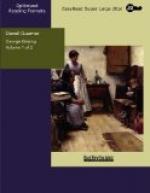She gave no answer.
“I can imagine how Mary will talk. ’Oh, nothing that Denzil does can surprise me! Whoever expected him to marry in the ordinary way?’ And then they’ll laugh, and shrug their shoulders, and hope I mayn’t have played the fool—good, charitable folks!”
Still she said nothing.
“Rather out of sorts to-day, Lily?”
“I wish we were going to stay here—never to go back to England.”
“Live the rest of our lives in a Paris hotel!”
“No, no—in some quiet place—a home of our own.”
“That wouldn’t suit me, by any means. Paris is all very well for a holiday, but I couldn’t make a home here. There’s no place like England. Don’t you ever think what an unspeakable blessing it is to have been born in England? Every time I go abroad, I rejoice that I am not as these foreigners. Even my Scandinavian friends I can’t help despising a little—and as for Frenchmen! There’s a great deal of the old island prejudice in me.”
Lilian smiled, raising herself slightly upon the sofa.
“These old Latin nations have had their day,” he continued, with a wave of the arm. “France, Italy, Spain—they have played their part in civilization, and have nothing left now but old relics and modern bluster. The future’s with us Teutons. If I were not an Englishman, I would be an American. The probability is that we shall have a hard fight one of these days with the Slavs—and all the better, perhaps; I don’t think the world can do without fighting yet awhile.”
“I should be sorry to hear you teaching people that,” said Lilian.
“Oh,” he laughed, “it wouldn’t fit into our electoral campaign! No danger of my preaching bloodthirstiness. But how I shall enjoy the bloodless fight down at Polterham! I want you to look forward to it in the same way. Do cheer up, Lily!—you see I have been gradually moving in this direction. When I found myself a man of means, I knew that the time had come for stirring. Writing about the Sea-Kings is all very well in its way, but I am no born literary man. I must get that book finished and published, though. It might help me with the constituency. A book gives a man distinction.”
“You seem to me to have changed very much.”
“No; it’s only that you didn’t know me thoroughly. To tell you the truth, that life of hiding away in London wasn’t a very good thing for me. I lived too much to myself. The half-dozen acquaintances I had were not the kind of men to profit me. Glazzard—well, Glazzard is an odd sort of fellow—helpful now and then, but on the whole musty. He has no ambition, thinks it enough to doze on among his pictures, and that kind of thing. The fact is, such companionship has made me conceited. I want to get among my equals and my superiors—as I shall do if I become a Member of Parliament.”
“Your equals—perhaps.”




